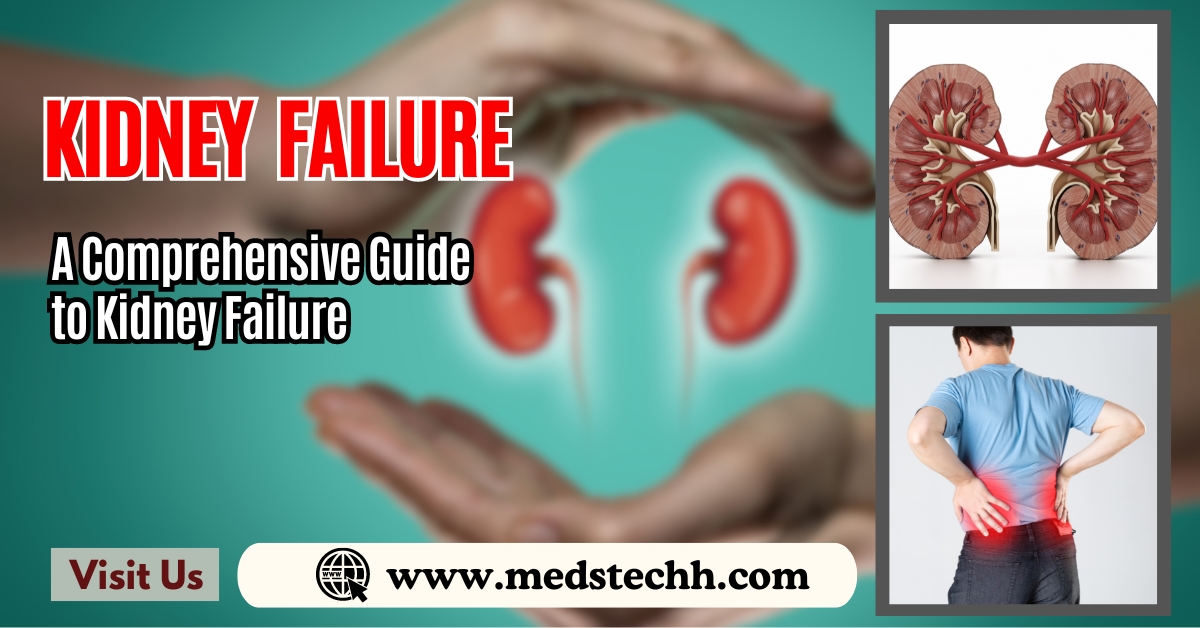Introduction to Kidney Functions:
The kidneys are a pair of bean-shaped organs situated on each side of the spine, just beneath the rib cage. They play a vital role in maintaining overall health by filtering waste products, excess fluids, and toxins from the blood, which are then excreted as urine. Kidneys help to regulate blood pressure, produce red blood cells, and maintain electrolyte balance in the body.
Understanding Kidney Failure:
Kidney failure, also known as renal failure, is a condition where the kidneys lose their ability to function properly, leading to a buildup of waste and toxins in the body. Understanding kidney failure is crucial for maintaining overall health and well-being.
Types of Kidney Failure:
Chronic Kidney Disease (CKD):
Chronic kidney failure, also known as chronic kidney disease (CKD), develops slowly over time and is usually irreversible. These conditions such as diabetes, high blood pressure, glomerulonephritis, or polycystic kidney disease frequently lead to it. Chronic kidney failure is characterized by a gradual loss of kidney function over months or years, eventually leading to end-stage renal disease (ESRD) if left untreated.
Acute Kidney Injury (AKI):
This type of kidney failure, also known as acute kidney injury (AKI), it occurs suddenly and is often reversible with proper treatment. It can be caused by conditions such as dehydration, severe infection, injury, or medication toxicity. Acute kidney failure is characterized by a rapid decline in kidney function, leading to a buildup of waste products and fluid in the body.
Causes of Kidney Failure:
Kidney failure can arise from a range of factors, such as:
- Diabetes.
- High blood pressure.
- Kidney infections or inflammation.
- Certain medications or toxins.
- Genetic predisposition.
Understanding the underlying cause is essential for determining the appropriate treatment and management plan.
Symptoms and Signs:
Several signs and symptoms may indicate kidney failure, including:
- Fatigue and weakness.
- Swelling (edema) in the legs, ankles, or feet.
- Variations in urine production, like heightened or reduced frequency.
- Nausea and vomiting.
It is important to recognize these symptoms early and seek medical attention promptly.
Diagnosis of Kidney Failure:
Blood Tests: Blood tests are essential for assessing kidney function. The following blood tests are commonly performed:
- Renal function test (RFT): Is full profile in which all the parameters are included.
- Complete Blood Count (CBC): low red blood cells suggest anemia.
- Serum Creatinine: Higher levels suggest reduce kidney function.
- Blood Urea Nitrogen (BUN): Increased levels may suggest kidney dysfunction.
- Glomerular Filtration Rate (GFR): Calculated from serum creatinine, it estimates the kidney’s filtering capacity.
- Electrolyte Levels (such as potassium, sodium, and calcium): Imbalances may occur in kidney failure.
Urine Tests: Urinalysis is essential for evaluating kidney health. The following urine tests are typically conducted:
- Urinalysis: Assesses for the presence of blood, protein, and other abnormalities.
- Urine Protein-to-Creatinine Ratio (PCR): Elevated levels suggest kidney damage.
- Urine Albumin-to-Creatinine Ratio (ACR): Elevated levels may indicate kidney damage in diabetic patients.
Imaging Tests: Imaging tests help visualize the structure of the kidneys and detect any abnormalities. Common imaging modalities include:
- Ultrasound: Provides detailed images of the kidneys to detect structural abnormalities or blockages.
- CT scan (Computed Tomography): Offers detailed cross-sectional images of the kidneys and surrounding structures.
- MRI (Magnetic Resonance Imaging): Provides detailed images without using radiation, useful for assessing kidney function and detecting abnormalities.
Treatment Options:
Medications:
Medications may be prescribed by Doctor to manage underlying conditions contributing to kidney failure, such as high blood pressure or diabetes. Additionally, certain medications may help slow the progression of kidney disease.
Dialysis:
Dialysis is a treatment method that helps remove waste and excess fluid from the blood when the kidneys are no longer able to do so effectively. There are various forms of dialysis, such as hemodialysis and peritoneal dialysis.
Kidney Transplant:
For some individuals with advanced kidney failure, a kidney transplant may be recommended. This involves surgically replacing a failed kidney with a healthy one from a donor.
Prevention of Kidney Failure:
While some risk factors for kidney failure, such as age and family history, there are some steps people can take to reduce their risk and maintain kidney health. These include:
- Maintaining a well-rounded diet that is low in sodium and free from processed foods.
- Maintaining proper hydration by consuming plenty of water.
- Avoiding excessive alcohol consumption and smoking.
- Managing underlying health conditions such as diabetes and hypertension.
- Regularly monitoring kidney function through routine check-ups and screenings.
Living with Kidney Failure:
Managing kidney failure involves making lifestyle modifications, including:
- Following a renal-friendly diet low in sodium, phosphorus, and potassium.
- Taking prescribed medications as directed by doctor.
- Seeking physical and mental health support to cope with the challenges of living with kidney disease.
Complications of Kidney Failure:
Complications associated with kidney failure include:
- Anemia, a condition that may result in tiredness and weakness.
- Bone disease, resulting from imbalances in calcium and phosphorus levels.
- Heart problems, such as high blood pressure and heart failure, due to the strain on the cardiovascular system.
Impact on Quality of Life:
Kidney failure can significantly impact an individual’s quality of life, leading to physical limitations and financial burden associated with ongoing medical care and treatment.
Support Systems for Patients:
Family and caregiver support play a crucial role in helping individuals cope with the challenges of kidney failure. Join supportive group to provides opportunities to connect with others facing similar experiences and share valuable insights and advice.
Conclusion:
Understanding kidney failure and its various aspects, including causes, symptoms, diagnosis, treatment, and prevention, is essential for maintaining kidney health and overall well-being. By adopting healthy lifestyle habits, seeking regular medical care, and accessing support systems, people can effectively manage kidney failure and lead fulfilling lives.
Unique FAQs:
- Can kidney failure be reversed?
- In some cases, early detection and treatment of underlying conditions contributing to kidney failure may slow or even reverse the progression of the disease. However, in advanced stages, kidney damage may be irreversible, requiring ongoing management.
- Is kidney failure hereditary?
- While some kidney diseases have a genetic component, not all cases of kidney failure are hereditary. Certain genetic conditions can increase the risk of developing kidney disease, but lifestyle factors and underlying health conditions also play significant roles.
- What dietary restrictions are recommended for peoples with kidney failure?
- People with kidney failure may need to follow a diet low in sodium, phosphorus, and potassium to reduce strain on the kidneys. It’s essential to work with a healthcare provider or dietitian to develop a personalized meal plan based on individual needs and medical history.
- Are there alternative treatments for kidney failure besides dialysis and transplantation?
- While dialysis and transplantation are the most common treatments for kidney failure, some individuals may explore alternative therapies such as herbal supplements or acupuncture. However, it’s crucial to consult with a healthcare provider before trying any alternative treatments to ensure safety and effectiveness.
- What are the primary factors leading to kidney failure?
- The main primary factor includes diabetes, high blood pressure, and chronic diseases affecting the kidneys.



